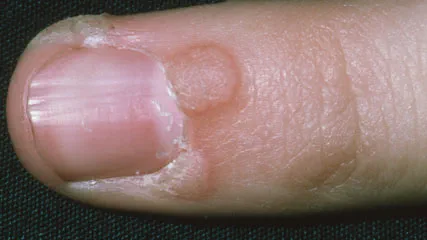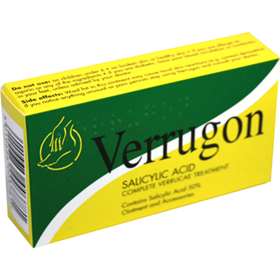When should I see a doctor about warts and verrucas?
Lets start with the basics.
1. What is a wart or verruca?
They are small, rough lumps or growths on your skin caused by the human papilloma virus (HPV). Most people get one, at some point in their lives. They are most common in children and young adults. A wart on the sole of your foot is called a verruca.
Even anyone can get either, people with weakened immune systems are more susceptible to developing warts and verrucas.
2. Where do they occur?
They are most commonly found on the hands and feet, but can appear on other parts of the body.
3. What do they look like?
Warts are usually skin-coloured and have a rough texture, whilst verrucas are usually raised, have a rough surface and may have black dots in the centre.

Typical warts

Typical verrucas
4. But should I see a doctor?
No. For most people, you do not need to see a doctor (e.g. your GP). You can diagnose and treat them yourself, with the help of your local pharmacist (if you need it).
5. Who should be referred to dermatologist (skin specialist doctor)?
Few a patients, if your treatment has not worked, your GP should consider referral you to a dermatologist (skin specialist doctor). Other reasons for referral include:
- Your GP or pharmacist is not sure it is a wart or verruca
- You have warts on your face
- Further tests are needed to confirm your diagnosis
- Large areas of your skin are affected
- Your warts are bothering you, and they haven’t gone away with salicylic acid or freezing (cryotherapy)
- You have lowered immunity because of a medical condition or medicines you are taking.
6. Incubation and infectivity
They can take several months to develop after being exposed to the virus. Warts are not usually painful. Verrucas can be painful if they occur on weight-bearing parts of the feet.
Are they contagious?
Yes, warts and verrucas are highly contagious and can spread through contact with an infected person or surface.
7. Are warts and verrucas dangerous?
No, neither cause you any harm, but some people find them itchy, painful or embarrassing.
Verrucas are more likely to be painful – like standing on a needle. Both usually go away (eventually) with no treatment.
But you can treat warts if they bother you, keep coming back or are painful
8. What is the treatment for warts and verrucas?
There are several treatments available for warts and verrucas, including over-the-counter creams, cryotherapy, and surgical removal.
It is best to start with a pharmacist. You can buy creams, plasters and sprays from pharmacies to treat warts and verrucas. Many are based on salicylic acid. This salicylic acid is a good one.

These treatments irritate the skin a little – but usually work. It is important to keep using them every day for a long time until the wart or verruca is completely gone. This can take up to 3 months.
You should not use these treatments on your face.
9. What happens if you do nothing?
Warts and verrucas usually go away on their own, but it may take several months or even years.
10. Prevention is key
Avoid walking barefoot in public areas and avoid sharing personal items like towels and shoes.
Summary
We have described when to see a doctor about warts and verrucas – i.e. not normally. We hope you understand them better now.
Other resource
Review article: Aboud, 2023

